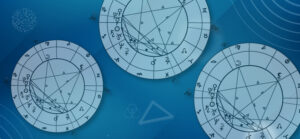The Phlegmatic Temperament in Astrology combines the Cold and Wet Qualities and is associated with the Water Element. Produces a sensitive and reserved personality, with a strong emotional motivation. Like the Melancholic Temperament, it is introverted, but the presence of Wet gives it plasticity and adaptability.
Index
Phlegmatic Temperament
Phlegmatic Temperament has a strong emotional motivation: he understands the world and makes decisions aimed at maintaining his security and emotional well-being. By privileging emotional "reasons", it can be very subjective and fickle ("what is good today because it makes me feel good, can be bad tomorrow because it makes me feel bad"), sometimes leading to incongruity.
You are interested in what you feel and what promotes your safety. You are enchanted by new people and new situations but easily adopt a passive and even a little lazy posture. In general, it is a shy and serene temperament.
Although emotion and feelings are the basis of Phlegmatic behavior, these are almost never overtly demonstrated. Although sensitive and empathetic, it avoids commitment and is not very expressive. Tends to take on conciliatory roles and has too much patience. When emotionally disturbed, he assumes a closed and even apathetic posture.
Due to its excessive malleability, its greatest defects are laziness and indolence. It hardly shows enthusiasm in its actions and determination in its goals. At its worst, its emotional self-centeredness manifests itself in the form of greed, cowardice, deceit, and sentimental manipulation.
By mingling with the Choleric Temperament, the Phlegmatic gains greater agility and boldness. The general expression tends to be more temperate, due to the contrast between the primitive qualities of both.
The participation of Sanguine adds the Warm Quality to it, which gives it greater joy and dynamism, minimizing the most static facets of the Phlegmatic Temperament. The predominance of Wet reinforces its flexibility and plasticity.
The combination with the Melancholic Temperament emphasizes the Cold, developing introverted characteristics. However, the addition of Dry gives it greater strength and perseverance.
In physiognomic terms, the Phlegmatic has a medium to short stature. It has a fleshy body, with a flaccid tendency and that is easily fattening. The skin is soft and cool to the touch, usually pale or whitish in color and with little hairiness.
This Temperament is associated with the mood called "phlegm", which is responsible for lubricating and maintaining the body's temperature. In modern terms, it corresponds to mucus and lymph.
Practical Application of Temperaments
Temperaments are the key to interpreting a Horoscope. Each planet or sign has affinities with one of the four Temperaments, which serves as a basis for defining its characteristics.
The combination of the temperament of a planet with that of the sign where it is positioned is the basis of astrological interpretation.
In Astrology, Natal is possible to determine the Temperament (or combination of Temperaments) of each individual. This global temperament describes the basic characteristics that condition all personal behaviors, motivations, and dynamics.
The manifestation of the particularities indicated on the map is always subject to the dominant Temperament. For example, an astrological indicator of aggression will have a different expression in a Choleric Temperament chart (which reinforces the aggressive tendency) or in a Phlegmatic Temperament chart (which retracts it). Temperament is, therefore, a kind of background against which the personality manifests itself.
The calculus to determine individual Temperament has a certain degree of complexity, which takes into account the relative weight of the four primitive qualities of the Horoscope.
Primitive qualities of the Ascendant and the Moon are considered (as well as the associated planetary configurations), to which the temperament of the Sun Zodiac Sign is added.
Source: Helena Avelar e Luis Ribeiro, in Tratado das Esferas - Um Guia Prático da Tradição Astrológica. Editora Pergaminho. Cascais, Portugal, 2007, pp. 45-6.
Primordial Qualities - The Principle of Everything
In Astrology, the vital energy manifests itself, initially, through the Primordial Qualities (also designated as Primary Qualities or Primitive Qualities). These are present in Nature and matter, subtly regulating cosmic energy.
All life forms are expressed through Primitive Qualities and they are also the pieces that constitute the elements, signs, and planets, that are, they are the basic foundation of Astrology.
Each of these axes represents opposite attributes:
- Hot and Cold
- Dry and Wet
Whereas:
- Hot - action, movement, impulsivity
- Cold - receptivity, passivity, melancholy, observation
- Dry - permanence, stagnation, crystallization, concentration
- Wet - flexibility, volatility, malleability
Primitive Qualities and the Energy of Planets
Planet/ Quality/ Element/ Temperament
- Sun - Hot and Dry = Fire (Choleric)
- Moon - Cold and Damp = Water (Phlegmatic)
- Mercury - this planet has no definite quality, as it tends to absorb the qualities of what it comes in contact with. However, when observed in isolation, without any other influence, it is considered Cold and Dry (Melancholic)
- Venus - Cold and Damp = Water (Phlegmatic)
- Mars - Hot and Dry = Fire (Choleric)
- Jupiter - Hot and Moist = Air (Blood)
- Saturn - Cold and Dry = Earth (Melancholic)
Or, otherwise categorizing:
- Sun and Mars - Hot and Dry
- Saturn and Mercury - Cold and Dry
- Venus and Moon - Cold and Wet
- Jupiter - Hot and Moist
The Four Humours in Astrology
- Choleric Temperament - Independent, Decisive, Goal-oriented, Ambitious
- Melancholic Temperament - Analytical, Detail-oriented, Deep Thinker and Feeler
- Phlegmatic Temperament - Relaxed, Peaceful, Quiet, Easy-going
- Sanguine Temperament - Enthusiastic, Active, Social








